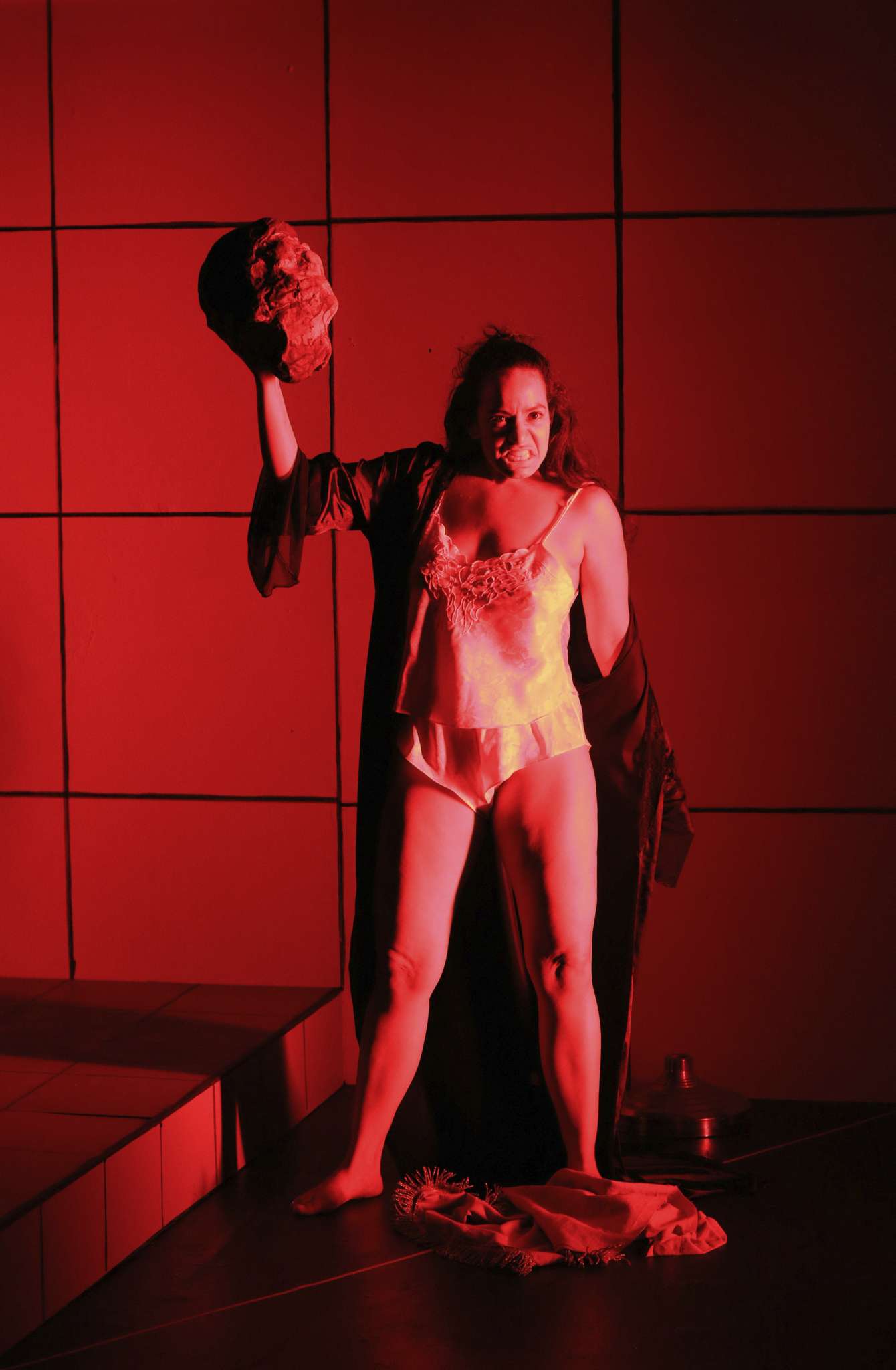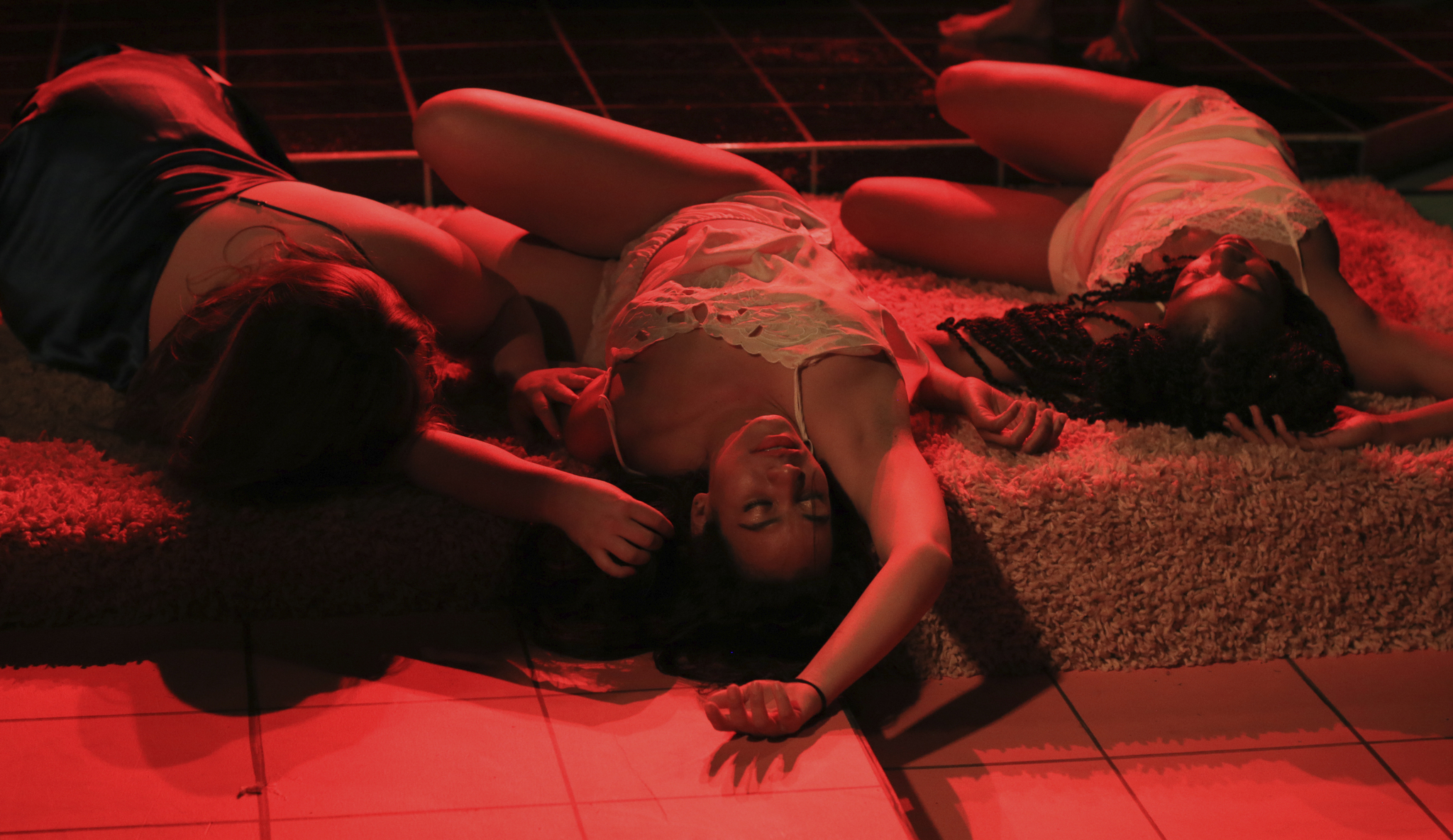Review of Bakkhai, Yale Summer Cabaret
The first show of Yale Summer Cabaret’s Verano season has come and gone. The Summer Cab’s Co-Artistic Director Danilo Gambini, with a cast of six female actors, delivered a sexy and scary and funny and unsettling version of Euripides’ ancient Greek tragedy Bakkhai as translated by preeminent poet Anne Carson. As a kickoff to the Summer Cab season one might say the play puts us on alert that theater’s seductions come at a peril.
Dionysos (Sarah Lyddan) and the Bakkhai (top to bottom: Zoe Mann, Nefesh Cordero Pino, Anula Navlekar) (Photos courtesy of Danilo Gambini)
The play has the temerity to put the god—or is that pseudo-god?—Dionysos (Sarah Lyddan) onstage and lets him get quizzed and dismissed by Thebes’ king Pentheus (Eli Pauley, in the getup of a military dictator) with the kind of disdain a police chief might aim at a local troublemaker. And Dionysus does make trouble. The women of Thebes—Malia West, Nefesh Cordero Pino, Anula Navlekar and Zoe Mann as an aroused chorus in negligees—are only too ready to worship him and are clearly doing so in a tranced and decadent way. What’s a ruler burdened with maintaining order to do?
Pentheus (Eli Pauley), front; background: Teiresias (Anula Navlekar), Kadmos (Zoe Mann)
We might feel we are watching a comedy in which each side—law and order vs. libidinous license—is going to get a big comeuppance, especially when we see two old-timers, Kadmos (Mann) and Teiresias (Navlekar) jumping on the bandwagon, off to take part in the Bacchic rites in clownish drag. Kadmos is Dionysus’ grandfather. The story is that Semele, Kadmos’ daughter by the goddess Harmonia, was impregnated by Zeus in the form of a lightning bolt—which incinerated Semele, so that Zeus had to rescue the unborn child, sewing him into his own immortal thigh from which Dionysos was born. Born of Zeus via a female half-mortal and half-immortal, Dionysos has no doubts that he’s a true god. And yet. Carson’s translation maintains use of the term daimon or daemon (from which we get “demon”) for what Dionysos claims to be, and that invites all sorts of colorations—especially in our Christianized world—about half-man/half-god hybrids who shake up the status quo with secret rites.
Dionysos (Sarah Lyddan) with Bakkhai (Malia West, left; Eli Pauley, right)
In any case, demonic is exactly how Lyddan plays Dionysos, an androgynous figure with the eyes, ringed in black, of one who regularly imbibes hallucinogens and a voice of clearest diction that runs from guttural to angelic to searing. Her Dionysos is a trip and a treat and not to be trusted. And that’s where the tragic dimension comes in, in the midst of all the seductive humor and high spirits. Lyddan keeps so resolutely her eyes on the prize, so to speak, to let us know that Dionysos sees all our human hubbub as barely worth his notice. Love him, hate him—in any case, woe unto you. He’s malevolent to anyone who crosses him—which Pentheus’ mother, Agave (Semele’s older sister), did when she dismissed the claim that Zeus was her sister’s lover. So Pentheus has to follow suit—only to be beguiled by the idea of spying on those secret rites . . .
The songs the chorus sings—developed by the ensemble and sound designer/composer Liam Bellman-Sharpe—are ably abetted by the voices of Malia West, who also spellbinds as a Herdsman, and Zoe Mann. The set—by Lily Guerin—occupies a diagonal corner of the space, with grand pillars and black tiles and a section lit bloodred (Riva Fairhall, lighting) when Agave (a fierce Cordero Pino) arrives with her son’s head, which she herself tore from his body, thinking him—thanks to Dionysos—a lion-cub.
Agave (Nefesh Cordero Pino) with the head of Pentheus
As with many Greek tragedies, there’s a somber “joke’s on you” quality to where we end up, if only because these plays were meant to demonstrate to the populace that the gods toy with us for their sport, so don’t get your hopes up about life ending well. A lesson that somewhere—in all the humanizing centuries since—we seem to have lost a clear sense of. Bakkhai is meant to put the fear back into theater.
And, ultimately, it does. Though I would’ve preferred a bit more breathless shock and awe in the Servant (Navlekar)’s delivery of what befell the hapless Pentheus, the image that stays with me is of Mann as grandfather Kadmos, bowed, rotund, particolored, with powdered face, tears streaming as he awakes from a dream, in which gods and mortals can be held to the same account, to the nightmare—called reality—in which only mortals suffer. Eventually, the ages would supply us with a god who suffers and dies for us . . . but that’s another story.
Bakkhai (Anula Navlekar, Nefesh Cordero Pino, Malia West)
Bakkhai
By Euripides
A new translation by Anne Carson
Directed by Danilo Gambini
Scenic Designer: Lily Guerin; Costume Designer: Alicia J. Austin; Lighting Designer: Riva Fairhall; Sound Designer & Composer: Liam Bellman-Sharpe; Projections Designer: Christopher Evans; Dramaturg: Emily Sorensen; Stage Manager: Alexus Cone
Ensemble: Nefesh Cordero Pino, Sarah Lyddan, Zoe Mann, Anula Navlekar, Eli Pauley, Malia West
Yale Summer Cabaret
June 6-15, 2019
The opening of the Yale Summer Cabaret’s next show, María Irene Fornés’ The Conduct of Life, directed by Jecamiah M. Ybañez, has been postponed from tonight, June 20, to tomorrow night, June 21. Shows at 8 p.m. and 11 p.m.





